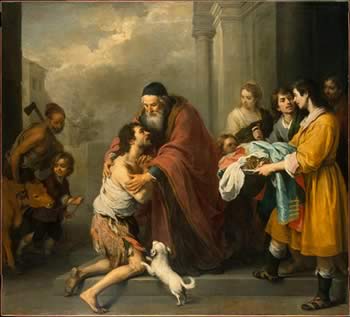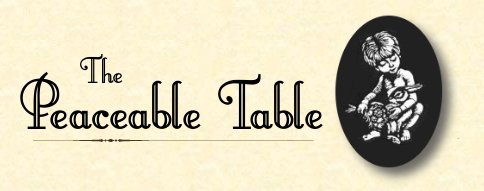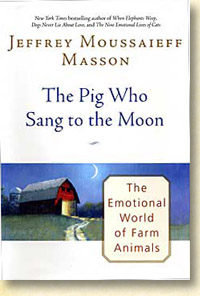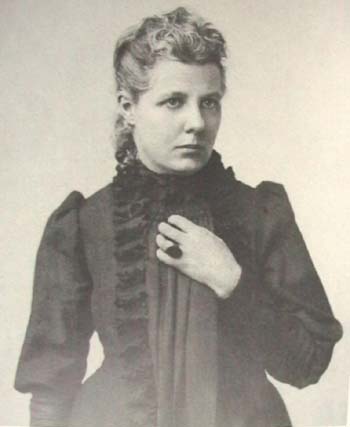Changing the Lenses

Christians have something less than a shining image in many animal advocacy circles. There is no doubt that many Christian leaders, from John Calvin to Pius IX, have been anything but friends to our animal cousins, and that Christian societies have been responsible for massive and horrendous violence against them. It is also true that many present-day evangelicals are wont to defend the status quo with such passages as Genesis 1:27, in which God tells the newly created human pair to "have dominion" over the animals, and the story of the prodigal son in Luke 15. Here the father, happy that his son has returned, gives orders that "the fatted calf" be killed to make a feast. Such uses of the Bible do not warm the hearts of animal advocates.
At the same time, however, we must acknowledge that vegetarianism--based on Christian principles--is growing at a remarkable pace among Christians, particularly evangelicals, whose tradition considers the Bible to be authoritative. Of course they are still a minority, but we can learn a good deal from such folk about the ways in which what we have always heard when familiar words are read is in fact the product of the cultural lenses we have worn, in this case lenses that have assumed that animals are mere things at human disposal.
For example, new interpretations point out that shortly after God tells Eve and Adam to have dominion over the animals, God assigns to them (and the animals) a vegan diet; the newly created world is to be nonviolent! At the point of their creation, God says "Let us make adam (humankind) in our image, after our likeness. . ." The human dominion that derives from God is thus to be as benign as that of the Creator, who certainly does not make the human couple in order to fatten, kill and eat them.
Startling new possibilities also emerge from the story of the Prodigal. It has always been obvious that the unconditionally-loving and forgiving father of the story is meant to represent God. But a parable is not merely a new illustration of threadbare truths; it is an extended metaphor, a world-upending comparison of two realities that are like in some ways and unlike in others. The father in the story is a human being, a patriarch heading a wealthy household in the Greco-Roman culture of Jesus' time, and there are some ways in which he is very unlike God. He rules over a household that includes both hired servants (mistheoi) and slaves (douloi). Southern plantation owners 180 years ago, given their own cultural lenses, were doubtless glad to take the story as endorsing their slave-based way of life, but no one in our culture would do so today.
Another point about this father seldom noticed is that despite the great and undying love in his heart for his erring son, which moved him to forget the son's terrible insult and abandonment, neither of his two sons had any idea that this love existed. It would appear that this human father, like many another family man in a patriarchal society, feared being vulnerable, and for years could not express love and tenderness. It seems he did not put his arms around his sons, or say "I love you," or show any empathy with their feelings that home was a dreary place where all that their father cared about was the work they could do. The reader gets the sense that the tender reunion with the younger son, and the ensuing celebration, were a new and startling development for both sons.
If God, then, is neither a slaveowner nor an emotionally frozen patriarch, why need we assume that another culture-bound detail of the story--the father's command to the slaves to kill a calf for the feast--expresses a loving God's evaluation of the value of animals? Evangelical vegetarians will not be slow to point out that we certainly need not. The father in the story is like God in his unlooked-for, unconditional love, but unlike God in the unthinking, casual violence of his (the patriarch's) command. The story conveys to us that the compassionate love of God is infinitely beyond our expectations. Why not, then, conclude that it is also by implication telling us that our small hearts were creating a comfortable idol when we saw God as holding animals to be soulless things, mere property, just as we humans have long done?
Philosophers, beginning especially with Kant, have pointed out that we cannot cease to see the world though some kind of lenses. There is much truth to this, but it is also true that we can gain awareness of our lenses to some extent, can look at them as well as through them, and change them when we perceive that they are inadequate and misleading. Continuing to open our hearts to infinite Divine love, we can be ready to change our lenses not only in regard to our own tradition, and to animals, but also to other religious people whom we have been wont to think of as hopelessly conservative and closed-minded. Love is the first and last word; Love has no limit.

 1 Tblsp. olive oil
1 Tblsp. olive oil I recently had the good fortune to view an Iranian movie called The Lizard about a thief who had been caught and sent to jail. In prison he took sick and in the infirmary met up with a cleric. The cleric, having a sense of a greater purpose in doing so, allowed the thief to steal his clothes and escape prison in the guise of a cleric. It was humorous and also meaningful, as the thief had to act the part of a cleric in the world outside prison because of his clothing. At one point he was asked to give a sermon. The only message he could come up with was what he remembered the cleric explaining to him as they lay in the infirmary and talked together. The thief espoused the view that there are as many paths to God as there are people in the world. Not surprisingly, by the end of the movie we see that the thief's experience acting the part of a cleric became his path to God. It was a wonderful movie.
I recently had the good fortune to view an Iranian movie called The Lizard about a thief who had been caught and sent to jail. In prison he took sick and in the infirmary met up with a cleric. The cleric, having a sense of a greater purpose in doing so, allowed the thief to steal his clothes and escape prison in the guise of a cleric. It was humorous and also meaningful, as the thief had to act the part of a cleric in the world outside prison because of his clothing. At one point he was asked to give a sermon. The only message he could come up with was what he remembered the cleric explaining to him as they lay in the infirmary and talked together. The thief espoused the view that there are as many paths to God as there are people in the world. Not surprisingly, by the end of the movie we see that the thief's experience acting the part of a cleric became his path to God. It was a wonderful movie. Jeffrey Moussaieff Masson, well-known author of insightful books on cats,
dogs, elephants, and animal fathers, has produced another outstanding book,
this time on the emotional lives of farm animals. Since these are the
beings raised to produce eggs, milk and flesh for humans to consume, the
book's very existence is revolutionary for the majority of people in our
culture. Farmers, especially the farmers who operate the concentration
camps known as factory farms, do not care to dwell on evidence that the
biomachines that to them represent earnings may in fact have feelings
closely resembling ours. But this is in fact just what Masson documents, in
an accessible, lively style.
Jeffrey Moussaieff Masson, well-known author of insightful books on cats,
dogs, elephants, and animal fathers, has produced another outstanding book,
this time on the emotional lives of farm animals. Since these are the
beings raised to produce eggs, milk and flesh for humans to consume, the
book's very existence is revolutionary for the majority of people in our
culture. Farmers, especially the farmers who operate the concentration
camps known as factory farms, do not care to dwell on evidence that the
biomachines that to them represent earnings may in fact have feelings
closely resembling ours. But this is in fact just what Masson documents, in
an accessible, lively style.

 And I think it's no disgrace
And I think it's no disgrace